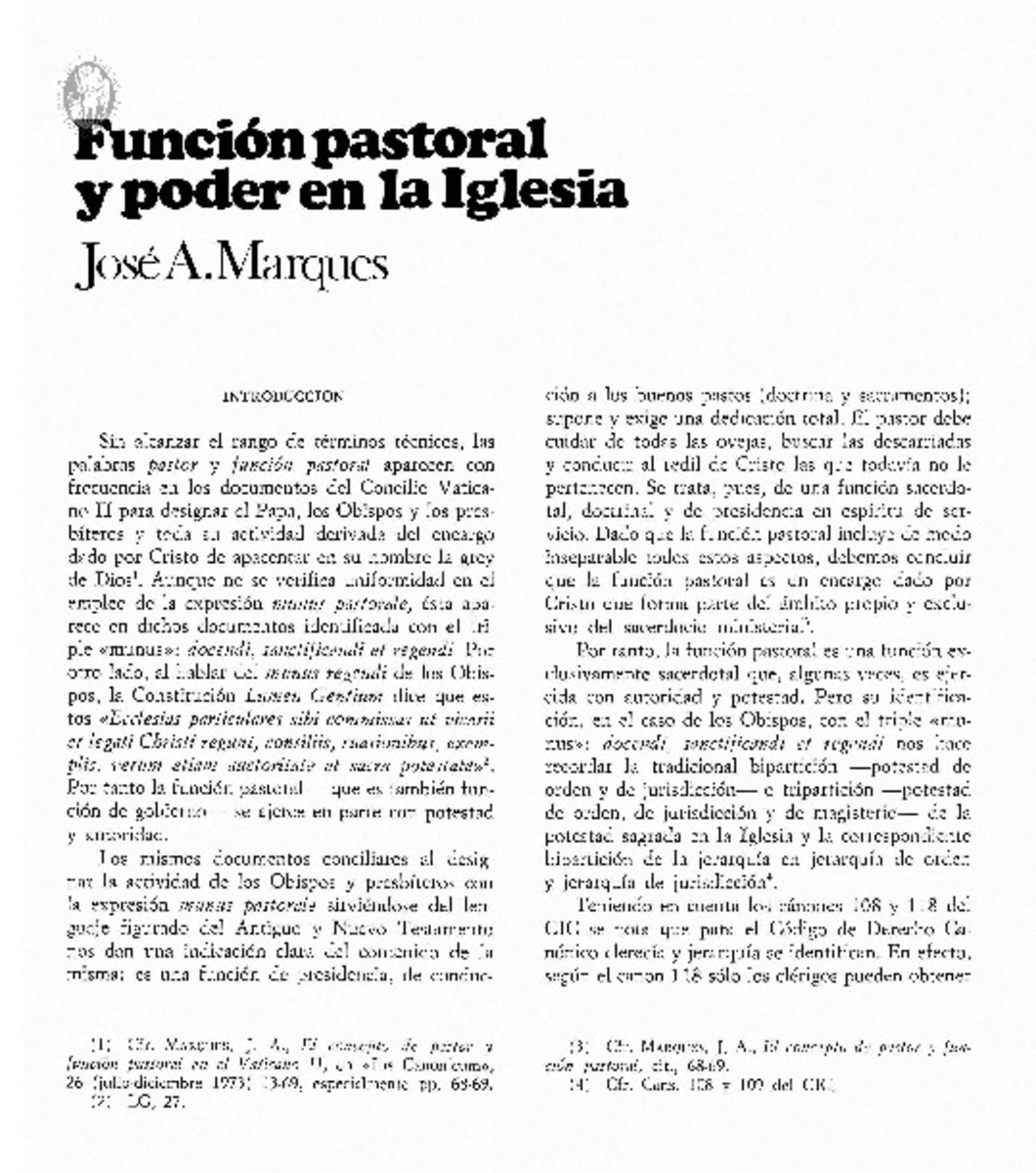Full metadata record
| DC Field | Value | Language |
|---|---|---|
| dc.creator | Marques, J. A. (José Antonio) | |
| dc.date.accessioned | 2010-12-18T10:54:15Z | - |
| dc.date.available | 2010-12-18T10:54:15Z | - |
| dc.date.issued | 1975 | - |
| dc.identifier.citation | IUS CANONICUM, XV, N.I, 1975, pág. 159-186 | es_ES |
| dc.identifier.issn | 0021-325X | - |
| dc.identifier.uri | https://hdl.handle.net/10171/14666 | - |
| dc.description.abstract | Summarium Etiam post Concilium Vaticanum 11 thema de relationibus inter munus pastorale et potes tate m in Ecclesia aliqua problemata ponit. Revera sive identificatic ordinis clericorum cum hierarquia et. recognitio exclusivae capacitatis clericorum ad titulum potestatis in Ecclesia habendum ex parte doctrinae anteconciliaris, sive communis bipartitio vel tripartitio potestat:s Ecclesiae conceptionem sic dictam personalistam hierarquiae ecclesiasticae supponere videntur. Doctrina Concilii Vatican; 11 prae occulis habita, problemata de relatione inter munus pastorale et potestatem in Ecclesia proposita melius solvi posse videntur, si in luce conceptionis sic dictae institutionalistae Ecclesiae considarentur. Studium muneris et potestatis in hoc contextu necnon relatio inter ministerium ecclesiasticum, munus pastorale, munus regendi et potestatem conclusionem permittere videtur secundum quam sensu juridico de potestate ordinis et de potestate magisterii independente a potestate jurisdictionis vel in ea inclusa loqui non deberet.----------------------------------- Abstract The topic of the relations between the pastoral function and power in the Church continues to put forward, after Vatican Council 11, a series of interesting problems. On the one hand, the identification by the preconciliar doctrine of clericate and hierarchy and its recognition of the exclusive capacity of clergymen to be the titularies of power in the Church, and , on the other hand, the famous bipartition or tripartition of the power of the Church, seem to have as background a personalistic vision of the ecclesiastical hierarchy. In the light of Vatican Council 11, it seems that the problems put fcrth by the relation between the pastoral function and power in the Church can be solved best when they are contemplated from the starting point of an institutionalistic vision of the Church. The sudy of the munus and the potestas in this context and the comparison between ecclesiastical ministry, pastoral function, governing function, and power seem to permit the conclusion that it must not be spoken of -in juridical terms- a power of arder and a power of magisterium independent of the power of jurisdiction, or in it included. | es_ES |
| dc.language.iso | spa | es_ES |
| dc.publisher | Servicio de Publicaciones de la Universidad de Navarra | es_ES |
| dc.rights | info:eu-repo/semantics/openAccess | es_ES |
| dc.subject | Función pastoral | es_ES |
| dc.subject | Poder eclesial | es_ES |
| dc.subject | Materias Investigacion::Teología y Ciencias religiosas::Pastoral y catequesis | es_ES |
| dc.subject | Materias Investigacion::Derecho canónico | es_ES |
| dc.subject | Iglesia católica | es_ES |
| dc.title | Función pastoral y poder de la Iglesia | es_ES |
| dc.type | info:eu-repo/semantics/article | es_ES |
| dc.identifier.doi | 10.15581/016.15.20564 | es_ES |
Files in This Item:
Statistics and impact
Items in Dadun are protected by copyright, with all rights reserved, unless otherwise indicated.






